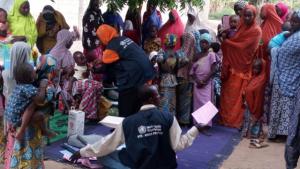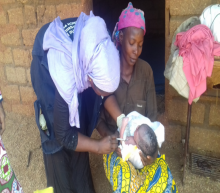Mobile Teams Provide Skilled Home Delivery in Hard-to-Reach Communities of Borno State.
Maiduguri, 30 March 2017- On that fateful day - 13th March 2017, mobile Hard-to-Reach (H-T-R) Team 07 was in Pela Olla community, Hauwul Local Government Area (LGA), Borno state, for its routine healthcare delivery sessions until a call came from a desperate father-to- be, Malam Mohammed whose wife, Hanatu was in labour.
It was Hanatu’s first delivery experience. The nearest health facility is located 10 kilometres away and no healthcare worker could be reached.
“When I went into labour, I wasn’t sure of what the outcome would be since it was my first experience and there was no nearby health facility or healthcare provider,” explained Hanatu. “I would have laboured at home without help from a healthcare worker until neighbours invited the H-T-R team working in Pela Olla community that afternoon. I was safely delivered of my baby girl.”
Hauwa, Hanatu’s daughter got a BCG vaccination within hours of delivery. Hanatu is among nearly 1 500 women of child bearing age who have benefitted from the ante/post-natal care provided by the mobile health teams. Thanks to the WHO-supported H-T-R teams. However, thousands of other women and children in need of urgent healthcare services are yet to be reached largely due to insufficient healthcare facilities, lack of healthcare workers and medicines, insecurity and difficult terrain.
“High insecurity, difficult terrain and inadequate number of health workers, medicines, equipment and basic amenities are making access to essential, lifesaving healthcare extremely difficult for people living in this conflict-affected area,” says Wondimagegnehu Alemu, WHO Representative, Nigeria.
Recent reports from Health Resources Availability Monitoring System (HERAMS) show that 64% of health facilities have been completely or partially destroyed and 32% completely non-functional, with 80% of LGAs having insufficient health service. Furthermore, 1.5 million are internally displaced, some to hard-to-reach locations and camps with limited access to regular health services.
Responding to the situation, WHO trained 35 mobile Hard-to-Reach teams in Borno state. The teams collectively conduct more than 400 healthcare sessions per month including treatment of minor ailments, home delivery, nutrition screening, and health promotion across 23 LGAs.
Each team comprises a 4-man health workforce; namely, a nurse/midwife who offers ante-natal and post-natal care services, key household health promotion and screens for high blood pressure; a senior community health extension worker for treatment of minor ailments and detection of acute flaccid paralysis (AFP) and vaccine preventable diseases; a junior community health extension worker for routine immunization, nutritional screening, administration of Vitamin A and De-worming tablet; and a health information management officer.
By mid-March 2017, the teams have attended to four home deliveries, vaccinated over 34 000 children against polio and measles, screened almost 17 000 for malnutrition, treated over 5000 clients for minor ailments, and detected six cases of AFP.
______________________
For more information, please contact :
Technical contact:
Dr Mary Stephen; Tel: +234 803 639 1332; Email: %20%20%20%20%C2%A0stephenm [at] who.int ( stephenm[at]who[dot]int)
Media contact:
Dr Chima Onuekwe; Tel: +234 803 535 4876 Email: %20%20%20%20onuekwec [at] who.int ( onuekwec[at]who[dot]int)
Below:
01. Mobile HTR providing integrated services in a Borno settlement.
02. HTR team member adminstering vaccine to a baby. Photo WHO-Aji Yaga





